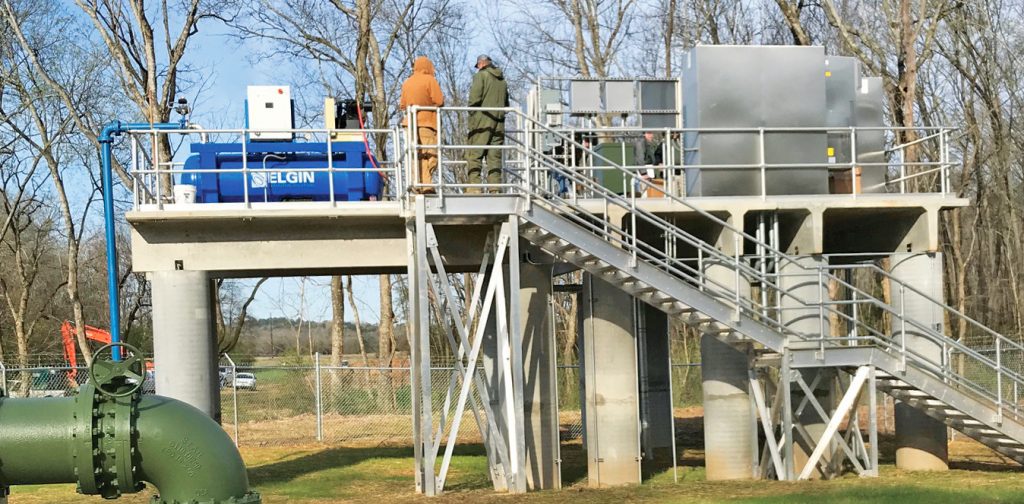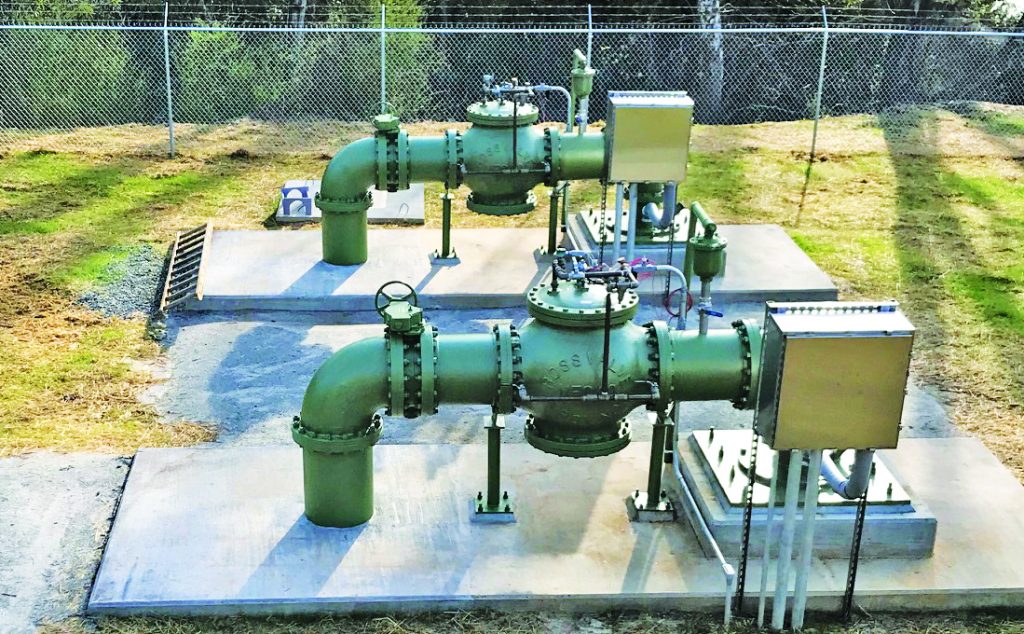
On March 13, the Town of Winnsboro’s new Pump Station on the Broad River was turned on for testing. The Town of Winnsboro funded this approximately $12 million dollar project, encompassing a new raw water intake pipe and construction of this pump station, with a State Revolving Fund State Drinking Water loan through the EPA.
WINNSBORO – Now that the initial paperwork is mostly finished, Fairfield County’s water and sewer plan is flowing closer to completion.
At the second meeting of the Fairfield Joint Water and Sewer Authority on Monday, the group received detailed reports covering everything from environmental impacts, roads to laying water and sewer pipes.
“They’re not in as [bad] shape as I thought,” said Neil Robinson, chair of Fairfield County Council and an authority board member. “They’re still going to need a lot of improvements.”
 Formed earlier this year, the authority’s goal is to bolster the county’s water and sewer system, particularly at the mega-site, a 1,113-acre parcel east of I-77 at exit 41 that the county has designated as an industrial hub.
Formed earlier this year, the authority’s goal is to bolster the county’s water and sewer system, particularly at the mega-site, a 1,113-acre parcel east of I-77 at exit 41 that the county has designated as an industrial hub.
By installing proper infrastructure, Fairfield County and Winnsboro town officials believe it will make the megasite more enticing to industries interested in launching operations here.
The authority predicts flow demand at the megasite to be about 1.11 million gallons per day.
Another 1.09 million gallons per day would be needed to serve the Weyerhaeuser property to the north, totaling 2.2 million gallons per day for both properties, according to engineering estimates.
The Town of Winnsboro, the area’s largest water provider, is currently permitted for 1.6 million gallons per day, but only has an available capacity of about 540,000 gallons, roughly half the projected capacity needs at the megasite.
Prepping the megasite for industry will require a two-step process, officials said.
In the early stages, the Town of Ridgeway would facilitate the construction of temporary water service while an outside party would use a “pump and haul” method to transport wastewater to an outside location for disposal.
DHEC approval would be required for the latter process.
“Initially temporary service is needed for what we call trailer city,” said Lisa Muzekari, also with Thomas & Hutton. “We are going to have a significant amount of workers on site, therefore water and sewer service needs to be provided for those employees while they are on site working.”
Long-term, the Town of Winnsboro would play an integral role in establishing permanent infrastructure, Muzekari said.
Water service would be provided by the Winnsboro water treatment plant. New distribution lines and an elevated water tank would be needed.
The Town of Winnsboro wastewater plant would initially handle sewer services, but only temporarily.
“A future wastewater treatment plant would be needed to accommodate the full build out of the mega site and any other development in the area,” Muzekari said.
While ensuring sufficient infrastructure needed to entice industry is in place, expanding water and sewer also lays the foundation for potential residential growth, Muzekari noted.
“Right now the proposed lines are to serve the megasite,” she said. “But the plant capacity is up to 2 [million gallons per day] with potential for 4 [million gallons per day]. Expanding for 4 [million gallons per day] would allow for that additional development.”
Cost estimates for the proposed upgrades weren’t available, though Muzekari said she’s using a 2 million gallon per day facility as a baseline.
Roads are another component of the megasite infrastructure formula.
The site already benefits from interstate access; it’s located off I-77 between exits 34 and 41. A proposed interchange could improve that access.
Brad Sanderson, also with Thomas & Hutton, said one interchange option is a divergent diamond pattern. The other would be a cloverleaf design, which he said would be built in the vicinity of Old Camden Road.

There haven’t been any glitches from an environmental standpoint. Sanderson said a preliminary review looking at the Weyerhaeuser tract just north of the megasite found no problems with wetlands or negative impacts on protected species.
He also said Thomas & Sutton is continuing with evaluating site work, utility and transportation costs.
“We’re just trying to figure out the overall development cost for a large development at this site,” Sanderson said.
Monday’s meeting also comes on the heels of recent investigative reports about the state of South Carolina’s water system.
Officials at Monday night’s water and sewer authority meeting noted that Winnsboro’s water is of high quality.
County Administrator Jason Taylor said statewide, authorities like the Fairfield group are becoming more common.
“The state itself is pushing hard and heavy to move from small individual systems,” Taylor said. [The state is] “trying to more rationally provide water and sewer services.”
In other business, the authority also voted to continue an agreement with the Pope Flynn Group law firm. Attorney C.D. Rhodes with the firm has been assisting the authority.
Since the authority has yet to collect revenues, the deal approved Monday night continues the existing arrangement in which the county pays 75 percent and the town 25 percent.
“It’s a basic continuation of the arrangement,” said authority chair and Winnsboro Mayor Roger Gaddy.











